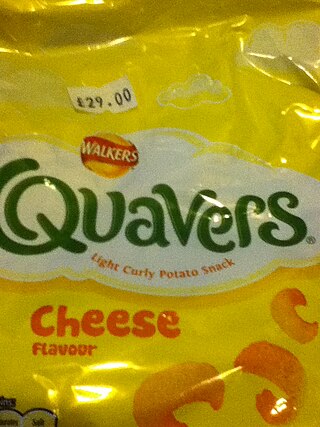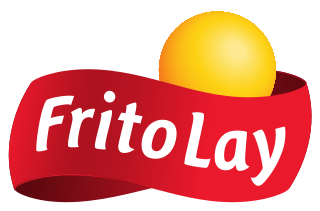
A potato chip or crisp is a thin slice of potato that has been deep fried, baked, or air fried until crunchy. They are commonly served as a snack, side dish, or appetizer. The basic chips are cooked and salted; additional varieties are manufactured using various flavorings and ingredients including herbs, spices, cheeses, other natural flavors, artificial flavors, and additives.

Hula Hoops are a snack food made out of potatoes and corn in the shape of short, hollow cylinders. Created by KP Snacks in the United Kingdom in 1973. As well as being sold in the UK, they are also sold in the Republic of Ireland, New Zealand and South Africa. Hula Hoops are also sold in Belgium under the "Croky" tag, made in the UK but marketed and distributed from Mouscron, Belgium. In France, Hula Hoops are produced by Vico.

Quavers are a deep-fried potato-based British snack food. Launched in the UK in 1968, they were originally made by Smith's in their factory on Newark Road in the Bracebridge area of Lincoln. Since 1997 they have been produced by Walkers. The name comes from the musical note, quaver.
Tayto Snacks is a crisps and popcorn manufacturer in Ireland, founded by Joe Murphy in May 1954 and owned by German snack food company Intersnack. It owns several brands, including its leading product of Tayto Crisps for which it invented the first flavoured crisp production process. The first seasoned crisps produced were Cheese & Onion. Companies worldwide sought to buy the rights to Tayto's technique. Tayto crisps are a cultural phenomenon throughout Ireland, so much so that in November 2010, Tayto opened their own theme park called "Tayto Park" near Ashbourne.

Old Dutch Foods, Inc. is a manufacturer of potato chips and other snack foods in the Midwestern United States, New England and Canada. Their product line includes brands such as Old Dutch Potato Chips, Dutch Crunch, Ripples, Cheese Pleesers and Restaurante Style Tortilla Chips.

Golden Wonder is a British company that manufactures snack foods, most notably crisps. These include Ringos, Golden Wonder and Transform-A-Snack. Since 2006, it has been a wholly owned subsidiary of the Northern Irish company Tayto, purchased from administration.

Twisties are a type of cheese curl corn-based snack food product, available mainly in Australia, and other Oceanian countries such as Papua New Guinea, New Caledonia, Vanuatu and Fiji, the Southeast Asian countries Malaysia, Thailand, Singapore and Brunei, and the island of Mauritius in the Indian Ocean. They are also available in Europe, but marketed as Fonzies, and in France as "Belin Croustilles". It was launched in 1950 by the General Foods Corporation. The brand name is owned by The Smith's Snackfood Company. While originally an Australian-owned company, Smith's was acquired in August 1998 by Frito-Lay, the second largest producer of snack foods in Australia, which in turn is owned by American multi-national PepsiCo. In Malaysia, Twisties is a product of Mondelēz International, after having been a part of Danone and later, Kraft Foods previously. In Thailand, the Twisties trademark is owned by Lay's, which like The Smith's Snackfood Company, is owned by PepsiCo.

Burger Rings are a type of corn-based, burger-flavoured Australian snack food distributed by The Smith's Snackfood Company, which, in turn is owned by PepsiCo.
Cheezels are a brand of Australian snack food currently produced by Snack Brands Australia. Made from corn and rice, they are a crisp puffy ring with a strong, savoury cheddar cheese flavour and aroma. They are similar in texture to cheese puffs, American Cheetos, or Canadian Cheezies.
Thins is one of the largest brands of savoury snack potato chips currently available in Australia, and is owned by Snack Brands Australia. The snack food is a thinly-sliced variety of potato chip (crisp) and comes in a variety of flavours, including Chicken, Original, Salt & Vinegar, BBQ Ribs,Cheese & Onion, Sour Cream & Chives and Light & Tangy. Thins compete chiefly with Smith's Thinly Cut, another thinly sliced potato chip, along with various crinkle cut brands.

Monster Munch are a British baked corn snack created by Smiths in 1977 and manufactured by Walkers. They are aimed at children and widely consumed in the United Kingdom. Flavours include Roast Beef, Pickled Onion and Sweet and Spicy Flamin' Hot.
Bluebird Foods Ltd is a New Zealand division of the U.S.-based PepsiCo corporation, that manufactures snack foods. All snacks are manufactured at the Bluebird Foods factory in Wiri, Auckland.
Tudor Crisps was a brand of potato crisps produced by Tudor Food Products. The business was started in Sunderland during 1947, and it supplied crisps to the North East of England and Scotland regions, claiming two thirds of the market in these regions. The company was purchased by Smiths Crisps in 1960. The brand continued under the ownership of Smith's by General Mills, Associated Biscuits and Nabisco, but was ended after PepsiCo purchased Smith's in 1989, and concentrated on the Walkers brand.

McCoy's is a brand of crinkle-cut crisps made in the United Kingdom by KP Snacks. It was first produced in 1985 and is marketed under the slogan "The Real McCoy's – Accept No Imitations", exploiting the Scottish idiom "the real McCoy". McCoy's is the third-biggest brand in the bagged crisps market, with 5 million packets consumed each week and nearly a third of all UK households consuming the product. It was once promoted by United Biscuits "as the only overtly male-targeted crisp brand".

Walkers Snack Foods Limited, trading as Walkers, is a British snack food manufacturer mainly operating in the UK and Ireland. The company is best known for manufacturing potato crisps and other snack foods. In 2013, it held 56% of the British crisp market. Walkers was founded in 1948 in Leicester, England, by Henry Walker. The Walkers family sold the business in 1970 to American food producer, Standard Brands. In 1989, Walkers was acquired by PepsiCo, owners of US snack brand Frito-Lay.

Frito-Lay, Inc. is an American subsidiary of PepsiCo that manufactures, markets, and sells corn chips, potato chips, and other snack foods. The primary snack food brands produced under the Frito-Lay name include Fritos corn chips, Cheetos cheese-flavored snacks, Doritos and Tostitos tortilla chips, Lay's and Ruffles potato chips, Rold Gold pretzels, and Walkers potato crisps. Each brand generated annual worldwide sales over $1 billion in 2009.
Real Crisps is a crisp brand. The company was founded in 1997, and expanded over the following decade to become a business turning over £15 million a year. In 2007, it was purchased by the Northern Ireland-based crisp manufacturer Tayto. In 2012, a fire caused the destruction of the 65,000 square feet (6,000 m2) Real Crisp factory in Crumlin, Caerphilly. There are a range of flavours produced, and the company ran a limited edition political themed range prior to the 2010 United Kingdom general election.

Toobs are a brand of Australian snack food, first created in 1954 by Albert Cranum, and owned and sold by the British Australian company The Smith's Snackfood Company, trading as "Smith’s". The potato-based flavoured snack took their name from the characteristic shape of the crisps.

Squares formerly known as Square and Square Crisps are a British brand of square-shaped crisps made by Walkers, a subsidiary of PepsiCo. They were originally made by The Smith's Snackfood Company.















